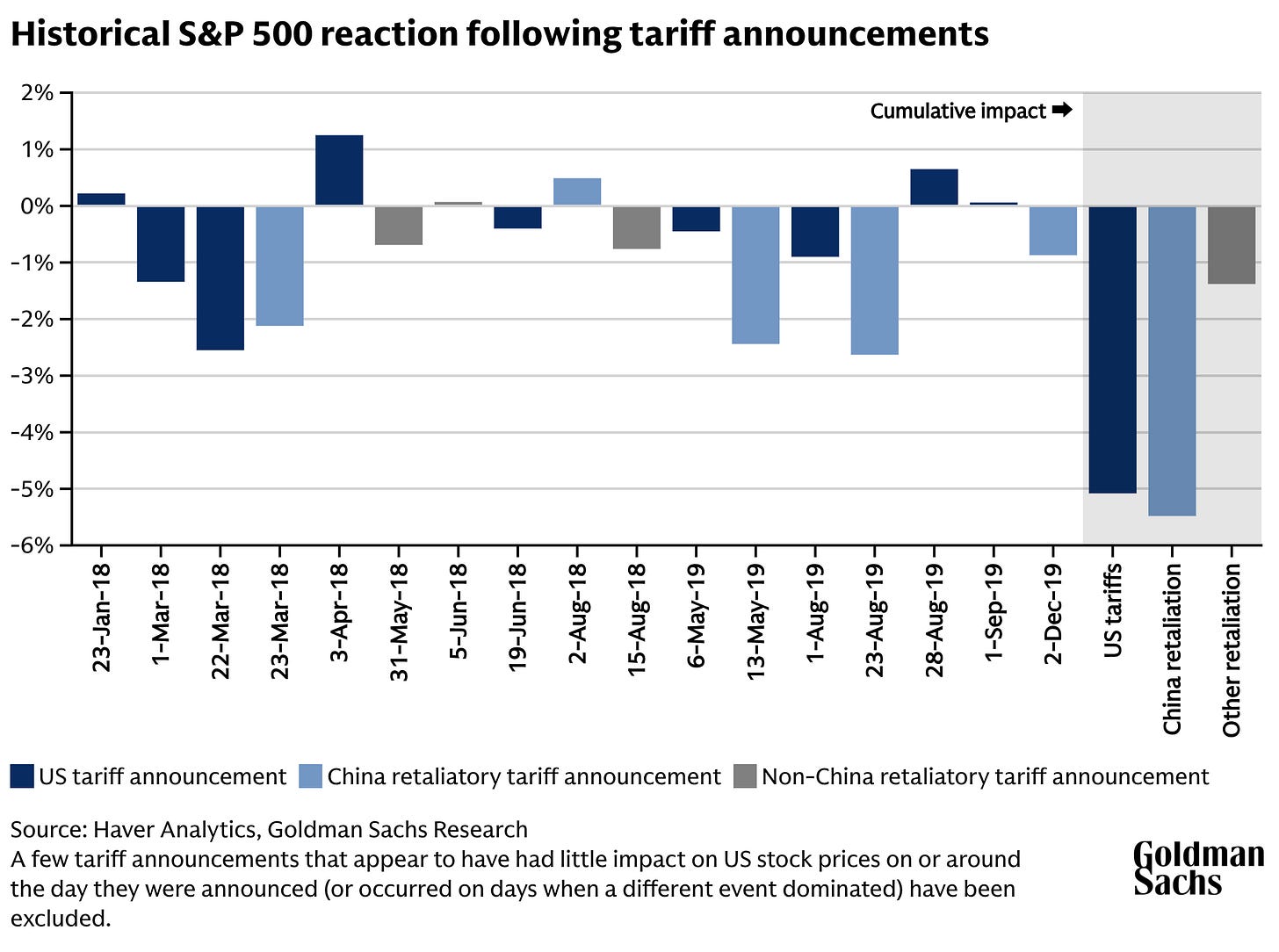Tariffs will make you quantum strong
Stop complaining and seize the opportunity
An invitation to be strong
A lot of people look at reality but refuse to see it. Denial is a psychological defense mechanism that involves refusing to accept reality or facts, allowing individuals to avoid anxiety and maintain emotional stability. After all, it was all so nice and comfy before, wasn’t it.
Unfortunately, denial only delays the treatment and increases the emotional harm - it is equally harmful to a relationship than the trigger, which prompted it.
A tariff is a duty (tax) imposed by the government of a country or customs territory, or by a supranational union, on imports (or, exceptionally, exports) of goods. Besides being a source of revenue, import duties can also be a form of regulation of foreign trade and policy that burden foreign products to encourage or safeguard domestic industry.
Yes, making money is important to the US President. More important, though, is that he wants you to understand that a strong relationship needs to be rooted in two strong individuals - he wants you to be independent and strong and thinks you need a cold shower to finally wake up.
Don’t even try to argue with daddy. Shower time!
Daddy never loses
This is the very core tenant of his belief system and the super simple, highly effective blueprint of his entire career.
Attack, attack, attack. Deny, deny, deny. Never admit defeat.
He will not stop. He knows no boundaries. And if you think that he will all the sudden be “reasonable”, well then get ready for an ice bath next.
Daddy is disappointed in you
…and emotions like that are so hard to contain. It’s like Thanksgiving dinner, you have been dreaming about a juicy piece of Turkey all year, watching football, but instead your family served you tofu and Taylor Swift.
Will you let them take away that one pleasure you had?
And yes, it is that basic, as disappointed as you, dear intellectual, might be.
Who runs the show
The administration is entirely reshaping who will execute on its vision and the bench of disciples is deep. No other qualifications required.
Stop arguing over right or wrong. No need to get excited over checks and balances - only the result counts.
This, ladies and gentlemen, is the baseline of what we are experiencing.
Tariffs and quantum
And in the middle of that sits our little quantum, like a grain of sand floating in the universe.
Quantum tech supply chain
Dozens of critical components that go into quantum hardware are affected by it.
When we look at critical components, those scored as having no substitute or workaround, we notice a lot of potential failure points in the supply chain - and they are not in favor of the “rest of the world”.
While the ROW dominates certain supply chain segments for less critical components, the US has a near monopoly in some niches when it comes to the most critical ones such as ADCs, magnetometers, mu-metal shields, Paul traps, temperature control systems or vapor cells.
The ROW has a more dominant position in critical components such as dilution refrigerators (at milli-kelvin temperatures) and in several raw materials such as rare earths and others.
The US has the stronger hand, while the ROW - if united - might have a deeper reach. A standoff is a losing proposition for the ROW, especially with unity, at any level, being as fictional as a Marvel movie.
Impact of tariffs on quantum tech
Overall, the supply chain is largely diversified and while bottlenecks might occur, I do not see a critical impact, especially since price sensitivity should be relatively low for the leading quantum vendors and labs. The impacts of tariffs on quantum tech will be felt otherwise:
Tariffs Increase Costs and Heighten Uncertainty
Across all advanced sectors — components, raw materials, and especially quantum technologies — tariffs add layers of complexity, cost, and risk. Firms are prone to delay investment, or pass cost increases on to end users.Strategic and Security Considerations Loom Large
Both national security agencies (like NATO) and private companies worry about the resilience of critical technology. Tariffs, when viewed as strategic tools, may encourage domestic production capacity but can also slow global cooperation on emerging technologies.Risk of Technological Fragmentation
In quantum technologies especially, collaborative progress thrives on open exchange of ideas and resources. Tariffs can accelerate a move toward “tech blocs,” creating multiple parallel technology ecosystems and limiting the talent and knowledge flow that underpins breakthroughs.Long-Term Realignment
Should these trade barriers persist, companies will adapt with new supply chains, governments may subsidize domestic sectors, and private capital will seek stable environments. Innovation will continue, but higher overall costs and slower timelines could change the competitive landscape — and, by extension, the global balance of technological leadership.
Fragmenting global supply chains, slowing innovation — particularly in sensitive fields like quantum technologies — and adding financial uncertainties that reverberate across defense, finance, and technology industries alike are the unintended consequences.
What it means for quantum tech
Streamlining vs. Fragmentation of Defense Supply Chains
A primary goals is to strengthen collaborative development of advanced defense capabilities, for example via AUKUS — ranging from nuclear propulsion for submarines to emerging technologies like quantum computing.
High tariffs on critical inputs (e.g., advanced alloys, rare earth elements, superconducting materials) can raise production costs and complicate the logistics of sharing or co-producing defense systems. Instead of a seamless flow of parts among countries, tariffs may encourage each to onshore or locally source components, leading to fragmented supply chains and higher costs.
Shared R&D in Quantum Technologies
Closer collaboration on cutting-edge tech, including quantum computing and quantum cryptography, because of their strategic and security value.
Tariffs on specialized hardware or software components used in quantum R&D (e.g., cryogenic equipment, qubit processors) could slow joint research efforts. If procurement becomes costlier or more cumbersome, multi-lateral pilot programs may see budget overruns or protracted timelines.
Balancing National Security with Economic Efficiency
Each country faces domestic pressures to protect key industries or ensure national security supply lines. Tariffs are sometimes seen as a means of bolstering domestic capacity for critical components.
Because collaboration is predicated on sharing high-end technology, imposing tariffs on each other’s exports could undermine the spirit of collaboration. In turn, that tension may force policy adjustments — either joint tariff exemptions or new trade coordination measures — to keep the alliance’s tech goals on track.
Potential for a ‘Mini Bloc’
AUKUS as an Economic/Military ‘Bloc’: In an environment of generalized trade barriers, the AUKUS partners could deepen internal trade facilitation for defense and tech. That might mean:
Reduced Tariffs Internally: A “free trade corridor” among Australia, the UK, and the US for essential materials and components, ensuring cost-competitive and secure supply.
External Tariffs: Tighter controls or higher tariffs on imports from non-AUKUS suppliers — particularly if there are security concerns.
Implication: While this could streamline trilateral collaboration, it risks isolating other allies or partners outside AUKUS, potentially setting off broader realignments in defense-tech supply chains.
A position of strength
The petrodollar agreement - the currency in which most oil trades are settled, including a recent long-term deal with Saudi Arabia - is celebrating its 50 year anniversary.
The USD remains the reserve currency of choice globally and that is unlikely to change.
Current market reactions are driven by behavioral dynamics and automated trading algorithms, unrelated to fundamentals and company earnings.
And the key indicators of the US economy remain exceptionally strong with one notable exception - investor and consumer confidence (aka uncertainty).
Unless you are prepared to completely turn around your own economic and political value systems, partner with Russia, China and India, then why would you pick a losing fight?
Instead, invest in (quantum tech) infrastructure and supply chains. Truly unite regional and global ecosystems. And, most importantly, be ambitious.
Stop doing small quantum. You will always chase ROI. you will always compromise on use cases and you will always be chased by classical. And, ultimately, run the risk to be unable to justify why we’re doing what we’re doing (quantum) in the first place.
The current tariff policies by the US government are a springboard for BIG quantum tech - the true, transformational, FTQC kind - both in the US, if it succeeds in generating new economic growth and invests it into a broad quantum vision. And for the ROW to invest, unite and be ambitious.
Nothing like a good purge to start anew!
A world of uncertainty
In the end, there is only one key takeaway - nothing is certain anymore. And there is only one choice to make - align & follow or lead & invest - to be spared from insignificance.
He will not stop.
#QuantumIsComing
This is my personal newsletter, all opinions are mine and do not represent GQI, The Quantum Computing Report and other affiliated entities.





